

[Infographie] Les MOOCs débarquent en France ! What Will The Ed Tech Revolution Look Like? During the past 40 years, accounting for inflation, we have nearly tripled the amount of money we spend per student in public K-12 education.

It was roughly $4,000 in 1971, and last year amounted to $11,000 per student. Over that same period time, our students’ math and verbal test scores have remained unchanged. I am no Warren Buffett, but I can comfortably say to you that that is a lousy return on investment. In an increasingly competitive world, it is clear that our education system--as currently designed--isn’t sustainable. What Will The Ed Tech Revolution Look Like? The Good MOOC: A review of Udacity's CS253 - Web Development.
Following on from Udacity’s successful CS101 course, CS253 - Web development starts from the basics of how the web works and goes through everything necessary to build a blog and scale it to support large numbers of users.
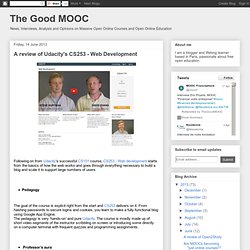
Pedagogy The goal of the course is explicit right from the start and CS253 delivers on it. From hashing passwords to secure logins and cookies, you learn to make a fully-functional blog using Google App Engine. The pedagogy is very ‘hands-on’ and pure Udacity. The course is mostly made up of short video segments of the instructor scribbling on screen or introducing some directly on a computer terminal with frequent quizzes and programming assignments.
Professor’s aura. Sebastian Thrun's Online Goal: Act Where College Isn't Working. Online classes can be enlightening, edifying, and engaging — but they're not college. The future of higher education online is, at present, clear as mud.
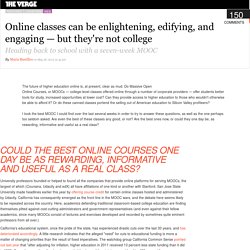
Do Massive Open Online Courses, or MOOCs — college-level classes offered online through a number of corporate providers — offer students better tools for study, increased opportunities at lower cost? Can they provide access to higher education to those who wouldn't otherwise be able to afford it? Or do these canned classes portend the selling out of American education to Silicon Valley profiteers? I took the best MOOC I could find over the last several weeks in order to try to answer these questions, as well as the one perhaps too seldom asked: Are even the best of these classes any good, or not?
Learning from the world. On a spring day in September 2012, Anant Agarwal , a professor at Massachusetts Institute of Technology taught a course called Circuits and Electronics.
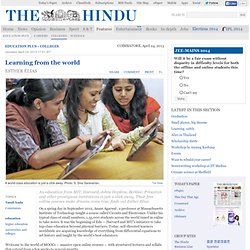
Stanford for everybody! Professor launches startup to make elite education available to all. NovoEd students at the Open University of West Africa computer lab in Ghana.

[/caption] Studying at Stanford no longer requires maintaining a near-perfect GPA while captaining three sports teams, running the high school newspaper, volunteering with a child literacy program, mastering the cello, serving as student council president, finding a solution to world hunger, and $225,000. NovoEd launched today to make access to courses from prestigious educational institutions available to anyone, starting with Stanford. The company started out as Venture Lab, a project run by a Stanford professor and a PhD student to make online learning more social, experiential, and interactive. Many Stanford professors were interested in taking their courses online but said presenting material in that format did not allow for the degree of interactivity they desired. “The platform is designed to map more closely how the world really works,” CEO Amin Saberi said in a Q&A. Photo Credit: NovoEd. Study: Online Courses May Be The Worst For Minorities And At-Risk Students.
Connectivism: A Learning Theory for the Digital Age. Connectivism: A Learning Theory for the Digital Age December 12, 2004 George Siemens Update (April 5, 2005): I've added a website to explore this concept at www.connectivism.ca Introduction.
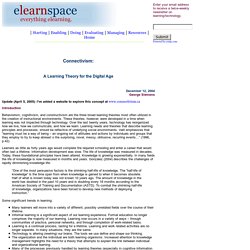
The MOOC Honeymoon is Over: Three Takeaways from the Coursera Calamity. The honeymoon with MOOCs is over.
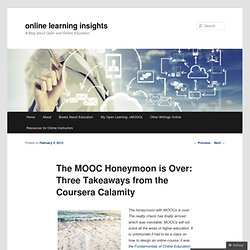
The reality check has finally arrived which was inevitable. MOOCs will not solve all the woes of higher education. MOOC and Open Online Education. What are the implications of MOOCs on Higher Education and University teaching?
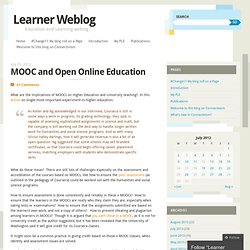
In this article on single-most-important-experiment-in-higher-education: As Koller and Ng acknowledged in our interview, Coursera is still in some ways a work in progress. Its grading technology, they said, is capable of assessing sophisticated assignments in science and math, but the company is still working out the best way to handle longer written work for humanities and social science programs. And as with many Silicon Valley darlings, how it will generate revenue is also a bit of an open question. Ng suggested that some schools may sell branded certificates, or that Coursera could begin offering career placement services, matching employers with students who demonstrate specific skills. What do these mean? How to ensure assessment is done consistently and reliably in these x MOOCs?
How will MOOCs make money? Dropping Out of MOOCs: Is It Really Okay? I’m starting to get more than a little grumpy about MOOCs, what with all the hype about the revolutionary disruptions and game-changing tsunamis.
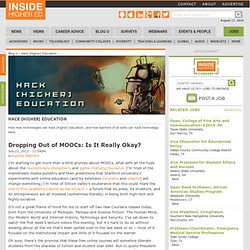
#MOOC disasters are human and part of educational innovation and why sandboxes are good. With the Coursera course on the Fundamentals of Online Education: Planning and Application being temporarily shut down due to a mix of unfortunate events (human miscalculation, limitations of technology, chaos...), sceptics of MOOC's feel strengthened.
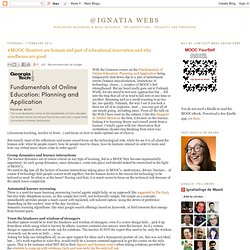
But my heart really goes out to Fatimah Wirth, for she dared to test new approaches but ... fell into the trap that all of us tend to fall into at one time or another: dreaming and as a result wanting to go too far, too quickly. Fatimah, the way I see it you took a blow for all of us explorers. And ... you sure got all of our minds going, including mine. From all the talk on the Web I have read on the subject, I like this blogpost by Debbie Morrison the best, it focuses on the learner, linking it to learning theory and overall needs from a learner. 11 Enlightening Statistics About Massive Open Online Courses. Despite the popularity of MOOCs in higher education, there is precious little data on them.
Stories of success and failure are almost universally anecdotal, with some statistics coming from MOOC platforms like Coursera and Udacity. 40 Useful Tips For Anyone Taking A MOOC. As these resources have grown in number and the list of institutions providing them has become ever more prestigious, free online courses are gaining legitimacy with employers as a method of learning valuable job skills. While there’s still a long way to go in terms of acceptance, more and more employers are recognizing the value of cheap, effective educational programs that can keep employees up-to-date and engaged in their field without spending a dime. Whether you’re looking to online education for personal reasons or to get ahead in your career, use these tips to help you get more out of open courses and use what you learn to market yourself, improve your performance, and stand out on the job.
Treat them like real classes .